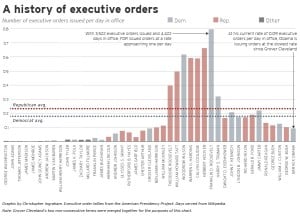Congress: Act Now was the clear message of President Obama’s State of the Union last Tuesday. It came with the corollary: If you don’t, I will.
This scorn deviated from Obama’s typical style. Each of the President’s five previous SOTU addresses was in response to a specific event and focused on the associated issue. In 2013, he called for gun control legislation after the tragedy at Sandy Hook. In 2012, he laid out his reelection campaign platform; one year earlier, he reacted to the rise of the Tea Party the previous November. And in his first, the new President responded to a shrinking economy and the fiscal collapse.
While 2013 was replete was similar events, perhaps the most significant political event of that kind was the government shutdown. However, in responding to the shutdown, the President focused less on budgetary policy and more on the politics.
More than any other event, the shutdown represented a Washington that is literally paralyzed by polarization. In fact, the shutdown is only the ugly face of the actual issue at hand: gridlock. This affects much more than budgetary politics – indeed, it has slowed nearly every single item on the President’s six State of the Union agendas.
In focusing on gridlock rather than advancing a new legislative agenda, Obama not only recapped the many challenges our country faces, but also reminded Congress that it has the power to (help) solve them. Just three minutes into his address, he declared: “The question for everyone in this chamber, running through every decision we make this year, is whether we are going to help or hinder this progress.”
Thus, in many ways, the policies proposed were rehashed from previous speeches. This was made explicit frequently. “Last year, I asked this Congress to help states make high-quality pre-K available to every four-year-old. As a parent as well as a President, I repeat that request tonight,” Obama stated.
Likewise, on issues like unemployment insurance and transportation, he reprimanded Congress and especially the GOP-controlled House for its inaction. On one of the most prominent of these issues, the President said: “Fix our broken immigration system. Republicans and Democrats in the Senate have acted. I know that members of both parties in the House want to do the same.”
Yet, it took a year longer for the House to release its immigration reform plan, compared to the Senate. If and when action will be taken remains unclear.
Going in a different direction, President Obama rightly asked the House of Representatives to stop wasting days in session with meaningless votes to repeal the Affordable Care Act. He added: “The first forty were plenty. We got it. We all owe it to the American people to say what we’re for, not just what we’re against.”
This is emblematic of our do-nothing Congress. It passed only 56 laws in 2013, according to the LA Times. Even Harry Truman’s “do-nothing Congress” passed 906. Indeed, three-fourths of Americans agree with the “do-nothing label,” a CNN poll demonstrates.
Even still, Republicans are trimming back their agenda. This complies with the GOP campaign slogan that since any government is bad government, fewer laws ensure a freer America.
Thus, President Obama pledged to do more on his own: “America does not stand still – and neither will I. So wherever and whenever I can take steps without legislation to expand opportunity for more American families, that’s what I’m going to do.”
For example, Vice President Biden was asked to review the nation’s job-training programs and offer a set of recommendations for improvement. Obama added: “And if Congress wants to help, you can concentrate funding on proven programs that connect more ready-to-work Americans with ready-to-be-filled jobs.”
In another instance, he told “every mayor, governor and state legislator in America” not to “wait for Congress to act” on the minimum wage. Going further, he committed to issuing an executive order to increase federal employees’ minimum wage from $7.25 to $10.10. Even that promise was a throwback: increasing the minimum wage was a policy laid out in the 2013 State of the Union.
The frequent promises of executive orders or executive action led some to label him a tyrant, or in the case of one Republican congressman, a “socialist dictator.” However, this simply is not supported by the facts. Obama issues executive orders at a rate of 0.09 per day, which is the lowest rate since Grover Cleveland was president.

In the end, this State of the Union seemed less substantive than past addresses. However, I argue that Obama’s promise to take independent action on proposals he’s already offered to Congress actually makes his speech more meaningful and suggests that 2014 could be more productive. Now we must hope that a hostile Republican House of Representatives will seek influence by cooperating rather than watch its power disappear to an active executive.
As Obama said, “Let’s see where else we can make progress together. Let’s make this a year of action.”
Contact Nick Ahamed at [email protected].